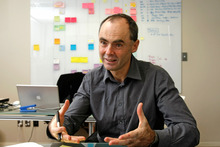May 9, 2013

Orion Health founder Ian McCrae says software patents are counter-productive and get in the way of innovation. Photo / Kenny Rodger
The Government has backed down on a controversial move to make software patentable in New Zealand
Commerce Minister Craig Foss said today that following industry consultation he had decided to remove the patentability of software from the Patents Bill, which is currently before Parliament.
“These changes ensure the Bill is consistent with the intention of the Commerce Select Committee recommendation that computer programs should not be patentable,” he said.
Foss thanked the New Zealand software and IT sector for their engagement over the last few months.
“I’m confident we’ve reached a solution where we can continue to protect genuine inventions and encourage Kiwi businesses to export and grow.”
New Zealand’s largest IT representative body, the Institute of IT Professionals, expressed relief and said the decision removed a major barrier to software-led innovation.
Chief executive Paul Matthews said although there were varied opinions on the matter, the consensus amongst professionals was that the patent system simply did not work for software.
“If you look at the New Zealand market, you would be hard pressed to find many people that were thinking patents would be a good idea.”
It was in New Zealand’s best interests for software to continue to be covered through the provisions of copyright – “a far more appropriate mechanism” – in the same way movies and books were, Matthews said.
“We believe it’s near impossible for software to be developed without breaching some of the hundreds of thousands of software patents awarded around the world, often for ‘obvious’ work.
“Thus many software companies in New Zealand, creating outstanding and innovative software, live with a constant risk that their entire business could be threatened due to litigious action by a patent holder.”
Patenting software would give large overseas firms the opportunity to monopolise a concept and crush smaller competitors through the legal system, he said.
Matthews said a recent poll of more than 1000 Kiwi IT professionals found 94 per cent wanted to see software patents gone.
A petition launched by the industry against software patents received over 1,000 signatures in under a week, he said.
New Zealand’s biggest software exporter, Orion Health, also welcomed Foss’ decision.
Chief executive Ian McCrae said obvious things were being patented under the current regime.
“You might see a logical enhancement to your software, but you can’t do it because someone else has a patent.
“In general, software patents are counter-productive, often used obstructively and get in the way of innovation.”
Internet New Zealand said Foss’ decision to amend the Patents Bill drew to a close “years of wrangling between software developers, ICT players and multinational heavyweights over the vexed issue of patentability of software”.
“Patenting software would not only make the continued development of the Internet more difficult, it would reduce innovation and could well stymie interoperability of various software platforms,” said Internet NZ spokesperson Susan Chalmers.
Matthews said discussion on the Patents Bill had been going on for a long time.
The Commerce Select Committee unanimously recommended in 2010 that software should not be patentable, which led to lobbying from patent lawyers and others.
Foss then released a Supplementary Order Paper (SOP) which had the potential to reverse this position but today released another SOP dumping the move.
